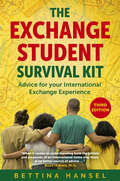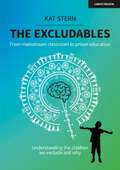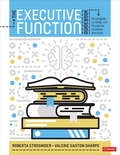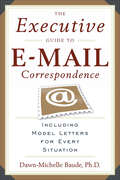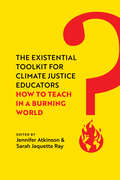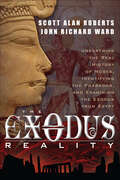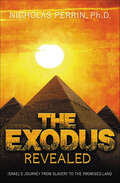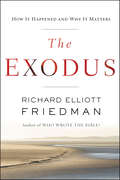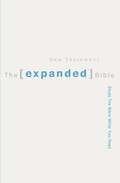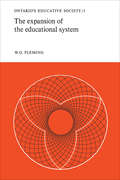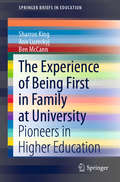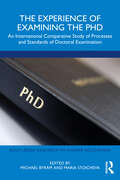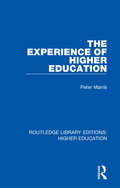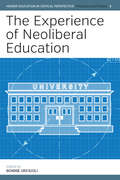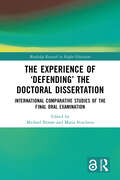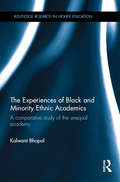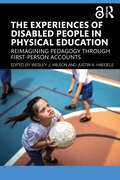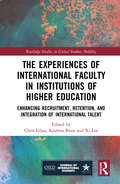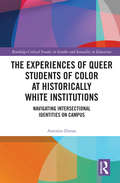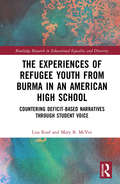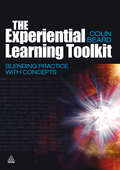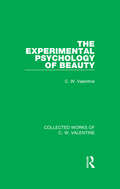- Table View
- List View
The Exchange Student Survival Kit: Advice for your International Exchange Experience
by Bettina HanselFOR STUDENTS GOING ABROAD, THE EXCHANGE STUDENT SURVIVAL KIT IS THE FIRST THING TO PACK!Study abroad has never been so popular. Students embarking on life-changing adventures need tried-and-true advice. Since 1993, THE EXCHANGE STUDENT SURVIVAL KIT has been the essential guide for young people traveling abroad, helping them better understand the unique experience of international exchange programs. More importantly, it shows students how to avoid many common misunderstandings and problems that can occur in the course of their adjustment to a new culture, a new family, a new school and a new community. Based on her years of research and professional involvement with AFS Intercultural Programs, Dr. Hansel has filled the book with examples taken from the experiences of dozens of exchange students from a broad spectrum of cultures. This much-awaited new edition includes* New communications technology as it affects the experience: e-mail, instant messaging, cell phones, online games and blogs and information searches.* Important advice on personal safety and pressing concerns for parents and students in light of war, terrorism and crime.* Changes in society and family life that affect travelers: fast food replacing family meals, a new emphasis on religious beliefs, consumerism and globalism.Now fully updated for the 21st Century THE EXCHANGE STUDENT SURVIVAL KIT supports young people who plan to become exchange students or who are already on such a program, showing how to manage the unexpected "culture shock" and deal with the specific issues that emerge when immersing yourself in an unfamiliar culture.
The Excludables: From mainstream classroom to prison education – understanding the children we exclude and why
by Kat SternWhen it comes to 'The Excludables', it is time to shake up the debate.Students who are excluded from school, and society, are at a higher risk of being incarcerated. They are more likely to have mental health difficulties, special educational needs, live in poverty, have social care involvement and they disproportionately come from certain ethnic groups. This book pulls on all those threads using up to date research and establishes a deeper understanding of how and why these things affect school behaviours. The factors that lead to exclusion are complex, and this book meets that challenge head on, including the kinds of “crunchy bits” that are usually avoided at all costs, such as children who are high in callous-unemotional traits, and trauma-informed approaches in prison education.Written by an experienced educator and behaviour consultant, this book steps away from the worn-out discourse that surrounds behaviour in schools, and away from the notion that educators are the only relevant experts. Get ready to explore genetics, bias, epistemic trust, and the human stress-response system; all examined through the lens of the realities of behavioural challenge faced by educators every day.This is a read that will confront everyone in some way.
The Excludables: From mainstream classroom to prison education – understanding the children we exclude and why
by Kat SternWhen it comes to 'The Excludables', it is time to shake up the debate.Students who are excluded from school, and society, are at a higher risk of being incarcerated. They are more likely to have mental health difficulties, special educational needs, live in poverty, have social care involvement and they disproportionately come from certain ethnic groups. This book pulls on all those threads using up to date research and establishes a deeper understanding of how and why these things affect school behaviours. The factors that lead to exclusion are complex, and this book meets that challenge head on, including the kinds of “crunchy bits” that are usually avoided at all costs, such as children who are high in callous-unemotional traits, and trauma-informed approaches in prison education.Written by an experienced educator and behaviour consultant, this book steps away from the worn-out discourse that surrounds behaviour in schools, and away from the notion that educators are the only relevant experts. Get ready to explore genetics, bias, epistemic trust, and the human stress-response system; all examined through the lens of the realities of behavioural challenge faced by educators every day.This is a read that will confront everyone in some way.
The Executive Function Guidebook: Strategies to Help All Students Achieve Success
by Roberta I. Strosnider Valerie Saxton SharpeTeach some of the most important skills your students will ever need! Executive function skills—including self-regulation, focus, planning, and time-management—are essential to student success, but they must be taught and practiced. This unique guidebook provides a flexible seven-step model, incorporating UDL principles and the use of metacognition, for making executive-function training part of your classroom routine at any grade level. Features include: Descriptions of each skill and its impact on learning Examples of instructional steps to assist students as they set goals and work to achieve success. Strategies coded by competency and age/grade level Authentic snapshots and “think about” sections Templates for personalized goal-setting, data collection, and success plans Accompanying strategy cards
The Executive Function Guidebook: Strategies to Help All Students Achieve Success
by Roberta I. Strosnider Valerie Saxton SharpeTeach some of the most important skills your students will ever need! Executive function skills—including self-regulation, focus, planning, and time-management—are essential to student success, but they must be taught and practiced. This unique guidebook provides a flexible seven-step model, incorporating UDL principles and the use of metacognition, for making executive-function training part of your classroom routine at any grade level. Features include: Descriptions of each skill and its impact on learning Examples of instructional steps to assist students as they set goals and work to achieve success. Strategies coded by competency and age/grade level Authentic snapshots and “think about” sections Templates for personalized goal-setting, data collection, and success plans Accompanying strategy cards
The Executive Guide to E-mail Correspondence: Including Model Letters for Every Situation
by Dawn-Michelle BaudeMake your messages shorter, simpler, and more effective with this guide to writing e-mails that get read—and get results.As we correspond with everyone from international partners to remote workers, writing skills are more important than ever to business and career success. They can make the difference between climbing the corporate ladder and getting stuck on a low rung. An e-mail that’s clear, concise, and targeted will get more than just a response. It will get results—including your boss’s attention.No matter what sector a company is in, excellent written communication skills are in demand—because too-long, wordy, or unclear emails bog down a business. This guide provides insight, guidelines, and a wide variety of templates to help you get it right and rapidly transform basic writing skills into global communications expertise. In a lively, here’s-how style, it:demonstrates the hallmarks of effective business e-mailsfeatures ready-to-use organizational planspresents quick and easy editing techniquesfurnishes before-and-after editing modelsfocuses on the do’s and don’ts of proficient e-mailssupplies practical writing tips and tricks, and more
The Existential Toolkit for Climate Justice Educators: How to Teach in a Burning World
by Sarah Jaquette Ray Jennifer AtkinsonAn easy-to-use field guide for teaching on climate injustice and building resilience in your students—and yourself—in an age of crisis. As feelings of eco-grief and climate anxiety grow, educators are grappling with how to help students learn about the violent systems causing climate change while simultaneously navigating the emotions this knowledge elicits. This book provides resources for developing emotional and existential tenacity in college classrooms so that students can stay engaged. Featuring insights from scholars, educators, activists, artists, game designers, and others who are integrating emotional wisdom into climate justice education, this user-friendly guide offers a robust menu of interdisciplinary, plug-and-play teaching strategies, lesson plans, and activities to support student transformation and build resilience. The book also includes reflections from students who have taken classes that incorporate their emotions in the curricula. Galvanizing and practical, The Existential Toolkit for Climate Justice Educators will equip both educators and their students with tools for advancing climate justice.
The Exodus Reality: Unearthing the Real History of Moses, Identifying the Pharaohs, and Examing the Exodus from Egypt
by Scott Alan Roberts John Richard Ward“An intriguing narrative . . . A complementary blend of scripture, ancient legends, history, and archaeology, it will stir your curiosity.” —Lorraine Evans, Egyptologist and author of Burying the DeadIn this groundbreaking work, the authors reexamine humanity’s most enduring account of bondage, emancipation, and freedom. The Great Exodus is the story of how one man, empowered by divine epiphany, brought the mighty ancient kingdom of Egypt to its knees. For thousands of years, this story has bolstered the faithful of three major religions, though little historical data confirms it. So the question must be asked: Did it ever really happen?Roberts, a historian and theologian, and Ward, an archaeologist, Egyptologist, and anthropologist, dig deeply into historical records to answer the most vexing questions:Is there any historical evidence for the biblical account of the Great Exodus?Was Moses a real person?Where is the Biblical Mount Sinai?What is the Ark of the Covenant, and where did it come from?Why did Moses write about the Serpent and the Nephilim?Is there a Templar and Masonic connection to the events and personages in the story?Did the Exodus take place under Amenhotep II or Amenhotep III, two pharaohs of the same royal house separated by two generations and eighty-odd years? Or were Thutmoses III, Hatshepsut, and Amenhotep Son of Hapu at the core of the action? The authors present two opposing, yet strangely interlaced historical accounts for the Exodus, naming the historical pharaohs and surprising candidates for the historical Moses. While Roberts presents an account that finds its moorings in the efficacy of scriptural historicity, Ward presents a new and completely unique theory for the Exodus and its cast of characters.
The Exodus Revealed: Israel's Journey from Slavery to the Promised Land
by Nicholas PerrinWhat really happened during Israel's journey from slavery to the promised land? Bible scholar Nicholas Perrin explains the true story of the Exodus while adding helpful background information from biblical history, archaeology, and more. You will . . .Explore the unvarnished Bible story of the ExodusLearn about ancient Egypt and PharaohCome to know the man and the mission of MosesFind out why the Ten Commandments were givenDiscover God's promise and plan for his people, then and nowAppreciate why every New Testament writer builds on the ExodusSee how the Exodus story relates to you, todayYou will gain a much richer understanding of what God has done for you and why the Exodus is the pivotal event in the Old Testament.
The Exodus: How it Happened and Why It Matters
by Richard Elliott FriedmanThe Exodus has become a core tradition of Western civilization. Millions read it, retell it, and celebrate it. But did it happen?Biblical scholars, Egyptologists, archaeologists, historians, literary scholars, anthropologists, and filmmakers are drawn to it. Unable to find physical evidence until now, many archaeologists and scholars claim this mass migration is just a story, not history. Others oppose this conclusion, defending the biblical account.Like a detective on an intricate case no one has yet solved, pioneering Bible scholar and bestselling author of Who Wrote the Bible? Richard Elliott Friedman cuts through the noise — the serious studies and the wild theories — merging new findings with new insight. From a spectrum of disciplines, state-of-the-art archeological breakthroughs, and fresh discoveries within scripture, he brings real evidence of a historical basis for the exodus — the history behind the story. The biblical account of millions fleeing Egypt may be an exaggeration, but the exodus itself is not a myth.Friedman does not stop there. Known for his ability to make Bible scholarship accessible to readers, Friedman proceeds to reveal how much is at stake when we explore the historicity of the exodus. The implications, he writes, are monumental. We learn that it became the starting-point of the formation of monotheism, the defining concept of Judaism, Christianity, and Islam. Moreover, we learn that it precipitated the foundational ethic of loving one’s neighbors — including strangers — as oneself. He concludes, the actual exodus was the cradle of global values of compassion and equal rights today.
The Expanded Bible: New Testament
by Thomas NelsonThe Expanded Bible: New Testament reflects the latest scholarship, current English, and the needs of contemporary students of the Bible. This new testament includes a multitude of study aids right in line with the text. Expanded translations and other helps make it possible for you to study the Bible while you readExpanded translations bring out the meaning of words and offer alternatives.Literal meanings of terms from the original languages are included where they can provide more understanding.Traditional wordings assist recollection of familiar terms and expressions.Comments explain passages that can be understood better with a brief remark.Useful references supply rewarding opportunities for comparing other Scriptures.Variants display additional wording in some of the original language texts.
The Expansion of the Educational System: Ontario's Educative Society, Volume I
by W. G. FlemingThis volume contains a general introduction to the whole series, followed by seven chapters giving most of the quantitative information in compact form. The introduction discusses some current issues and problems in education: the economic value of education to the individual and to society, the effects of automation, the role of the school in social and emotional development, vocational training and physical development, and the relationship between education and social class. The main body of the text describes the quantitative growth of the educational system and is organized into seven topics: characteristics of the population, school enrollment, the proliferation of educational institutions, university enrolment, enrolment in other post-secondary institutions, and the financing of the system. It contains much specialized statistical material including 46 charts and 225 tables, and will be an excellent work of reference.
The Experience of Being First in Family at University: Pioneers in Higher Education (SpringerBriefs in Education)
by Ben McCann Sharron King Ann LuzeckyjThis book provides an in-depth analysis of what it means to be the first in family at university. It examines the factors that influence first in family students' decisions to enrol, attend and continue at university, and how their hopes, dreams and ambitions for the future affect their university experience. Using survey data and semi-structured interviews, the book offers valuable and far-reaching insights into the first in family student experience, and provides recommendations for future practice at the national and institutional level for teaching and professional staff as well as for first in family students. As universities face intense competition for students and growing economic constraints due to funding cuts and increasing costs, this book comes at a critical time.
The Experience of Examining the PhD: An International Comparative Study of Processes and Standards of Doctoral Examination (Routledge Research in Higher Education)
by Michael Byram Maria StoichevaThis book provides an authoritative overview of the criteria and standards of the doctorate across a wide range of international settings, with a particular focus on the practices of examining. Presenting case studies and research from 13 universities in 13 countries across Africa, Asia, North and South America, Australia, and Europe, the book is based on in-depth interviews and comparative analyses of the PhD examining experience. It reveals the variations and similarities in different academic traditions and investigates the extent to which there are comparable expectations and standards across countries. It suggests that criteria and standards – both written and unwritten – are broadly similar, but shows that there is a need for much more explicitly formulated criteria and standards for an internationalised approach to doctoral assessment. Following on from the 2019 book The Doctorate as Experience in Europe and Beyond, this book will be of great interest to current and potential doctoral examiners, researchers of higher education, and university administrators.
The Experience of Higher Education (Routledge Library Editions: Higher Education #17)
by Peter MarrisOriginally published in 1964 The Experience of Higher Education reports the findings of about 400 intensive interviews with final year undergraduates at three universities – Cambridge, Leeds and Southampton – and a College of Advanced Technology in London. The discussion concentrates upon the aims and expectations with which students enter higher education; the relationship between teacher and pupil; the influence of residential patterns; and the students sense of the relevance of their education in a wider social context. The final chapter is a more personal reflection, in the light of the enquiry, upon the ideals and purposes of higher education.
The Experience of Neoliberal Education (Higher Education in Critical Perspective: Practices and Policies #4)
by Bonnie UrciuoliThe college experience is increasingly positioned to demonstrate its value as a worthwhile return on investment. Specific, definable activities, such as research experience, first-year experience, and experiential learning, are marketed as delivering precise skill sets in the form of an individual educational package. Through ethnography-based analysis, the contributors to this volume explore how these commodified "experiences" have turned students into consumers and given them the illusion that they are in control of their investment. They further reveal how the pressure to plan every move with a constant eye on a demonstrable return has supplanted traditional approaches to classroom education and profoundly altered the student experience.
The Experience of ‘Defending’ the Doctoral Dissertation: International Comparative Studies of the Final Oral Examination (Routledge Research in Higher Education)
by Michael Byram Maria StoichevaThis volume describes, compares, and analyses the experience of ‘defending’ the doctoral dissertation in a final oral examination in universities and traditions in the European Higher Education Area (EHEA) and beyond.Forming the basis for a comparative study of the different traditions, 11 case study chapters include analysis of the regulatory framework; semi-structured interviews with candidates, examiners, and supervisors; and ethnographic observations of the defence. Cases are drawn from universities in Bulgaria, Denmark, England, France, Germany, Italy, Portugal, Slovenia, the USA, and China. Further chapters analyse comparatively the findings in the case studies and explore crucial themes such as the nature and purpose of the defence, the composition of examining committees, the role of supervisors, and the idea of the defence as ritual and performance.Providing unprecedented levels of detail into a process often perceived as hidden from academic debate, this book will enrich the experience of both new and existing candidates as well as examiners and supervisors, and will be of further interest to researchers, scholars, and postgraduate students working on the study of higher education, international and comparative education, and assessment in higher education.
The Experiences of Black and Minority Ethnic Academics: A comparative study of the unequal academy (Routledge Research in Higher Education)
by Kalwant BhopalRecent research suggests that Black and minority ethnic (BME) academics remain underrepresented, particularly at senior levels in higher education, and tend to be concentrated in new, post-1992 universities. This book provides an original comparative study of BME academics in both the UK and the USA, two different yet similar cultural and political climates, considering issues of inequality, difference and identity in the Academy. Presenting a distinctive and engaging voice, the book discusses the complexity of race, gender and identity in the context of higher education, an area that continues to appear to be dominated by white, middle class values and perspectives. Chapters offer an up-to-date commentary on the purpose, failures and potential of research on race, gender and identity, and its place within contemporary education and sociology. The book broadens the understanding of educational research, considering both sociological and cultural discourse, as well as examining racialized and gendered identities from a theoretical and analytical standpoint. The book closes by offering suggestions for viable policy shifts in this area. The Experiences of Black and Minority Ethnic Academics will be of key interest to researchers, academics and postgraduate students in the field of education, as well as sociologists wanting to learn more about black and minority academics in higher education.
The Experiences of Disabled People in Physical Education: Reimagining Pedagogy through First-Person Accounts
by Justin A. Haegele Wesley J. WilsonBringing together a set of first-person accounts of physical education from the perspectives of disabled children and adults, this book puts disabled people’s voices in the foreground.The book provides a rich set of case study material that deepens our understanding of the experiences of disabled people and challenges students, researchers, and practitioners to reflect critically upon their own positionality. The first part of the book discusses the ways in which disability has been conceptualized, how the voices of disabled people have sometimes been marginalized, and how nondisability power has historically framed the narratives of disabled people in physical education literature. It also discusses the innovative methods used in this book—such as storytelling through recorded conversations and drawings in addition to more traditional chapter writing—to empower disabled children and adults to act as authors of their own stories. Then the book presents the stories themselves in a variety of written, narrative, and alternative formats, a series of authentic accounts of the lived experiences of disabled people in physical education. Finally, the book concludes with the editors’ final thoughts and reflections about this collection of stories that can be used in the classroom to foster dialogue and encourage critical thinking. Importantly, these prompts have been co-constructed between the editors and the disabled people themselves.This book is essential reading for any course in adapted physical education, physical education, or disability, for any pre- or in-service teacher, instructor, or coach working with disabled people, and for people who experience disability or their families with an interest in education, physical activity, or methods for elevating the voices of disabled people.
The Experiences of International Faculty in Institutions of Higher Education: Enhancing Recruitment, Retention, and Integration of International Talent (Routledge Studies in Global Student Mobility)
by Krishna Bista Chris R. Glass Xi LinResponding to the growing need for recruitment and retention of international talent in higher education institutions globally, this volume documents the experiences and contribution of international graduate students, researchers, and faculty. This text foregrounds perspectives around recruitment, transition, integration, professional development, and the retention of scholars originating from, or arriving in, countries including China, Australia, Iraq, Japan, and the US. By investigating the support systems that are in place to assist foreign-born faculty members in institutes of higher education, the text provides important insights for departments and institutions as they look to successfully attract and retain global academic talent. Moreover, the scientific and practical implications of the research presented in the text directly informs institutional policy, working towards more effective, inclusive, and equitable ways to support international faculty. This text will benefit researchers, academics, and educators with an interest in higher education, international and comparative education, and, more specifically, those involved with faculty development programs. The text will also support further discussion and reflection around multicultural education, international teaching and learning, and educational policy more broadly.
The Experiences of Queer Students of Color at Historically White Institutions: Navigating Intersectional Identities on Campus (Routledge Critical Studies in Gender and Sexuality in Education)
by Antonio DuranThis significant text employs an intersectional analysis and considers the role of queer frameworks to understand the experiences of Queer People of Color at historically white institutions of higher education in the U.S. By presenting data from student interviews and reflection journals, the book explores what it means to hold multiple minoritized identities, and asks how such intersections are navigated, contested, and experienced on college campuses. Exploring both micro- and macro-level mappings of marginalization and power, the text reveals issues including institutional erasure, pervasive whiteness in college and LGBTQ+ communities, and institutionalized racism and heterosexism, and offers in-depth insights into the material, psychological, emotional, and social impacts on queer students of color. Ultimately, the analysis highlights the necessity of employing intersectional frameworks for addressing interlocking systems of oppression and offers recommendations for the integration and support of queer students of color at historically white institutions (HWIs). This monograph will offer invaluable insights for scholars, researchers, and graduate students working in the fields of gender and sexuality, higher education, and issues of educational equity, who wish to realize the potential of intersectionality as an analytic framework for the study of identity and development of affirming educational environments.
The Experiences of Refugee Youth from Burma in an American High School: Countering Deficit-Based Narratives through Student Voice (Routledge Research in Educational Equality and Diversity)
by Mary B. McVee Lisa RoofThis timely volume uses critical ethnographic methods to trace the experiences and identities of refugee students from Burma as they move through their final year of schooling in an urban high school in the United States. Against the backdrop of increasing tensions surrounding immigration and identity in America, The Experiences of Refugee Youth from Burma in an American High School presents an analysis of the academic paths of adolescent immigrants and the challenges they face throughout their schooling. Delving into the historical and socio-political context of the school and surrounding landscape, this volume offers an immersive, insider perspective of the educational circumstances of SaySay, Paw Htoo, and Hlaing, the three newcomer youths—from Burma. Through detailed ethnographic narratives, readers are introduced to resilient adolescents who navigate their way through the maze of social expectations, language-learning demands, and ethnic-related tensions to rebuild their identities in the United States. By highlighting the students’ stories and identities, the book shows how racism is subtly woven into the fabric of education in the United States, and how schools can provide more equitable schooling for newcomers from other nations. This volume will benefit graduate students, researchers, academics, and pre-service teachers in the fields of English language learning, refugee and immigrant education, and the sociology of education. Those with an interest in urban and multicultural education will also find this text useful.
The Experiential Learning Toolkit
by Colin BeardThe Experiential Learning Toolkit presents a diverse range of practical exercises, which are based on the theory of experiential learning. Experiential learning is concerned with learning through direct experience, which aims to create more effective, engaging and embedded learning. Each activity presented includes a description of the underlying principles, practical information on delivering the exercise as well as tips and further reading. The exercises cover a range of training needs including; effective customer service, telephone skills, applying strategic thinking, and developing creativity. Trainers will find this an invaluable resource, with fresh approaches which engage and inspire learners.
The Experiential Learning Toolkit: Blending Practice with Concepts
by Colin BeardThe Experiential Learning Toolkit presents a diverse range of practical exercises based on the theory of experiential learning, which is concerned with learning through direct experience to create more effective, engaging and embedded learning. Author Colin Beard has compiled more than thirty internationally tried and tested learning 'experiences', which cover corporate training, individual and organizational development and education. Each experiential activity includes the essential practical information required to deliver the exercise. As well as design tips and further reading there are clear titles for each activity that highlight the underpinning core theoretical concepts. The Experiential Learning Toolkit includes a wide range of training needs and topics including: effective customer service training and telephone skills; outdoor learning, including service learning; negotiating and assertiveness skills; strategic and higher level thinking; effective presentation skills; developing innovative and creative minds. Trainers will find this an invaluable resource, with fresh approaches that will engage and inspire learners. The Experiential Learning Toolkit is a companion text to the internationally best-selling Experiential Learning by Colin Beard and John Wilson (also published by Kogan Page).
The Experimental Psychology of Beauty: The Experimental Psychology Of Beauty (Collected Works of C.W. Valentine)
by C.W. ValentineOriginally published in 1962, the experimental study of aesthetics was a field particularly associated with the name of C.W. Valentine, who in this book provided a critical review of research carried out since the end of the nineteenth century principally by British and American psychologists. The investigations described, many of them conducted by the author, are concerned with individual responses to what is commonly regarded as beautiful in painting, music, and poetry, an important distinction being made between the perception of objects as ‘beautiful’ as opposed to ‘pleasing’. The reactions of children and adults, and of people having different ethnic and social backgrounds, are explored in a variety of experiments dealing with specific elements, including colour, form, and balance in painting; musical intervals, discord, harmony, melody, and tempo; and rhythm, metre, imagery, and associations in classical and romantic poetry. Other experiments seek to disclose the temperamental and attitudinal factors underlying individual differences in the judgement and appreciation of specific works of art. Of particular interest are the studies of responses to modern paintings, poems and musical compositions. The findings throw light on the development of discrimination and taste and suggest the possibility of some common factor in the appreciation of these three arts. It was felt that critics as well as psychologists and aestheticians would find much to encourage reflection and to stimulate further research.
